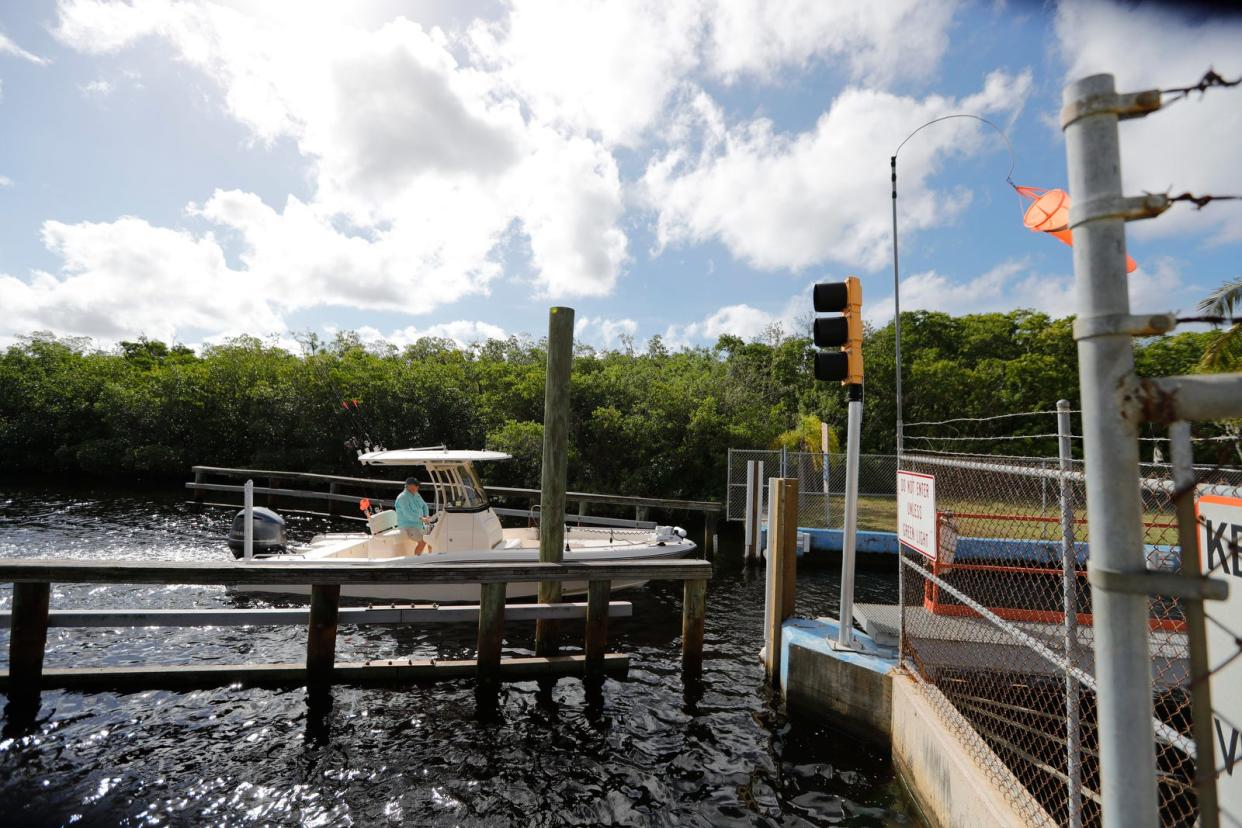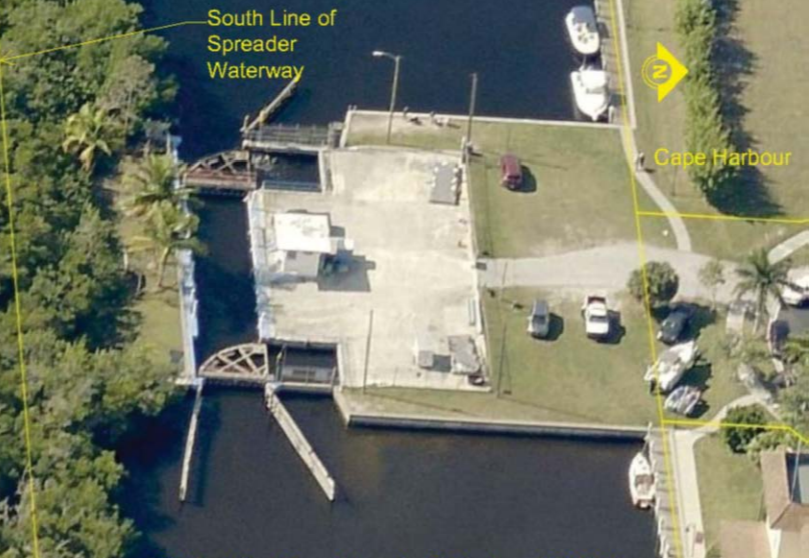Judge OKs next step toward Chiquita Lock demolition; advocates vow to fight on

Though some boaters are celebrating as if southwest Cape Coral’s controversial Chiquita Lock were almost gone, environmental advocates plan a challenge if the state approves its scuttling.
Offering Gulf access at Cape Harbour, the lock has been a chronic irritation for boaters, who often have to wait for others to pass through the structure, which was built to curb pollution and protect mangroves and habitat.
Earlier this week, administrative law judge Suzanne Van Wyk ruled the city could ask the Florida Department of Environmental Protection for permission to demolish the dilapidated barrier between saltwater and fresh at Camelot Canal and the Southwest Spreader Waterway.
Matlacha attorney Michael Hannon, who's leading the charge to keep it in place, points out that it's only a recommended order. "The secretary of the Department of Environmental Protection, Shawn Hamilton, has the final say for the department. We are confident that either Mr. Hamilton or the Florida District Court of Appeal ultimately will deny the application."
Why? "Because the recommended order ignores the obvious: Cape Coral's pollution of the Matlacha Pass and the Caloosahatchee River has increased under Florida's regulatory process."
What's more, Hannon says, "The Florida permitting process recently was ruled unconstitutional by a federal court in Washington, D.C. The department's own data confirms its process is broken, and (Van Wyk) apparently believed she lacked the power to face these facts at her level of authority."
Controversial Chiquita Lock broken since Hurricane Ian
The lock hasn't worked since Hurricane Ian, says Cape Coral Councilman Tom Hayden: "The storm surge and all the salt water took care of all the mechanisms inside the lock. So it's been open for more than a year and a half now (and) the city decided it had been rendered ineffective (and to) apply for a DEP permit to have it removed.”
The lock was court-ordered more than three decades ago after the city’s early developer, Gulf American Corp., damaged mangrove wetlands in the 1970s, says retired longtime planner and biologist James Beever. Along with another structure, the Ceitus Boat Lift, the lock would retain some 800 acres of brackish water, allowing it to slowly filter through a protected mangrove fringe before entering Matlacha Pass and the Caloosahatchee, Beever says. This was important because at the time, that part of the Cape was on septic instead of the municipal sewer network now in place, and the system was supposed to function as pollution control. In order for such a system to function, it had to be plugged, Beever says: The lock was one plug; the Ceitus boat lift the other.
But by 2018, with central sewer in place, the lock had outlived its usefulness, Hayden says. “Through the years after the utility expansion … the lock started to fail, boaters struggled with it and marine life struggled with it."
The city began asking for its removal.

Thus began an elaborate chain of legal proceedings, of which Van Wyk’s ruling is the latest. And it certainly won’t be the last, vows Hannon. He promises if the DEP green-lights the permit, the fight will continue in a higher court.
Environmental groups: 'The lock should remain in place'
Last year, several prominent environmental nonprofits withdrew from the case, after the city hired a law firm known for what Hannon calls "scorched earth" tactics designed to "quash citizen involvement in local government affairs (by) running up fees on the taxpayers’ dime, and intimidating the non-profit organizations and individual citizens", Calusa Waterkeeper said in a statement.
The threat of potentially crippling legal fees caused Waterkeeper as well as the Sanibel-Captiva Conservation Foundation to back away from the action. “We are disappointed that we are not able to continue as a petitioner,” SCCF CEO James Evans said at the time. “However, we remain committed to our position that the lock should remain in place and to our mission to protect and care for Southwest Florida’s coastal ecosystems.”
Environmental groups retreat: Nonprofits cite "intimidation" from Cape Coral over Chiquita Boat Lock
Calusa Waterkeeper Codty Pierce told The News-Press he couldn't risk his organization's financial future. "We are a grassroots organization, (and) need to survive to continue to provide for our community and a safeguard for water quality."
Cape Coral Realtor: 'We finally have won, and rightly so'
Yet many in the Cape are convinced things will be fine without the lock, including Realtor Gloria Tate, who's also served on city council. "We finally have won, and rightly so," she said.
Tate has witnessed years of dangerous behavior by boaters and visitors, including people swimming in the canal along with dolphin and manatees, "so it's really dangerous."
On holidays, she's watched as multiple boats backed up behind the lock waiting to get out. "You know how people are driving ‒ it's the same way with boating: Somebody gets a little upset, you're not going fast enough and before you know it you've got a traffic jam."
Most importantly, Tate says, "We corrected the environmental issues they were concerned about," she said. "The people of Cape Coral hoping the lock would be removed are stewards of the environment," she insists. "They're stewards of the mangroves and stewards of safety – and not just boating safety – people’s safety."
Hannon's not buying it.
He points out that the environmental permitting process is based on computer modeling done in 2009, "where the so-called scientists and engineers came up with an imaginary calculation of the pollutants that are in the Caloosahatchee River basin." From that model, they determined who was responsible for cleaning up the pollution, divvying it up between municipalities, including Cape Coral. Like others, Cape Coral had to prove it was reducing pollution.
Problem is, Hannon says, last year, the DEP determined the actual pollution level is "mega-factors greater than the model anticipated in 2009, and that all of the (calculations) are no longer sufficient and have never been sufficient to accomplish the goal ... The inefficiencies are built in in order to permit development."
What's next for the Chiquita Lock?
Judge Van Wyk's recommendation goes to the Department of Environmental Protection, which can grant a demolition permit.
Opponents have 15 days to file objections, then each side has another 10 days to file replies, Hannon says, before Secretary Hamilton makes a final decision.
It he does recommend demolition, opponents will take their challenge to the appellate courts.
This article originally appeared on Fort Myers News-Press: Is Cape Coral's Chiquita Lock on its way out? Ruling heads to state

